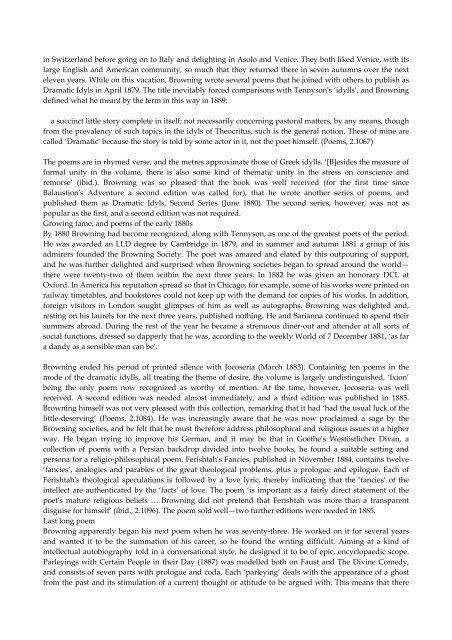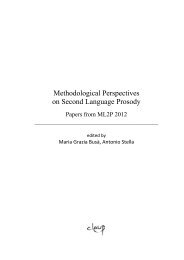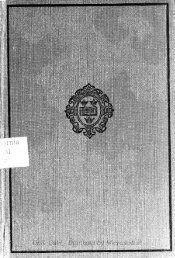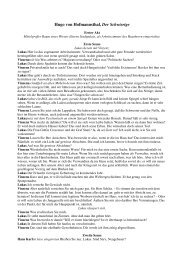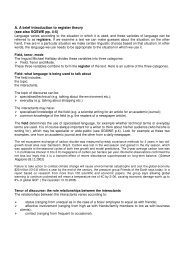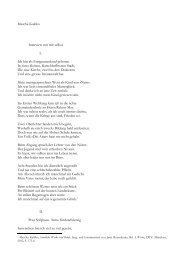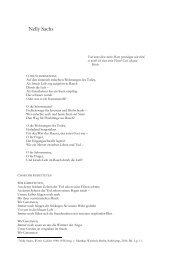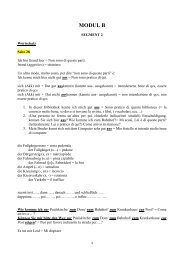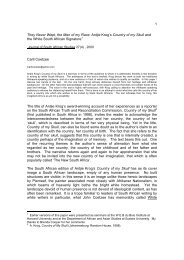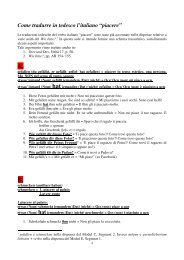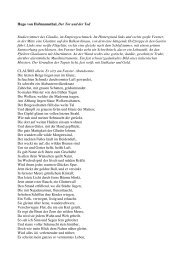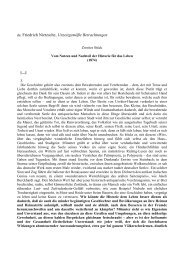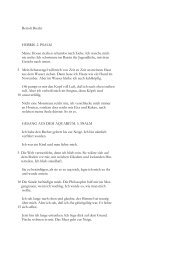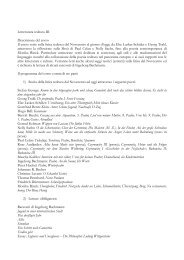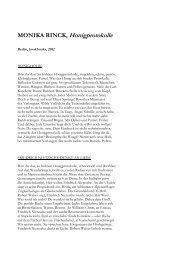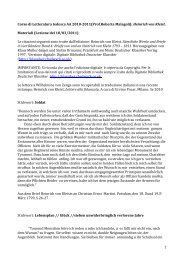The lives of the poets from The Dictionary of National Biography ...
The lives of the poets from The Dictionary of National Biography ...
The lives of the poets from The Dictionary of National Biography ...
Create successful ePaper yourself
Turn your PDF publications into a flip-book with our unique Google optimized e-Paper software.
in Switzerland before going on to Italy and delighting in Asolo and Venice. <strong>The</strong>y both liked Venice, with its<br />
large English and American community, so much that <strong>the</strong>y returned <strong>the</strong>re in seven autumns over <strong>the</strong> next<br />
eleven years. While on this vacation, Browning wrote several poems that he joined with o<strong>the</strong>rs to publish as<br />
Dramatic Idyls in April 1879. <strong>The</strong> title inevitably forced comparisons with Tennysonʹs ‘idylls’, and Browning<br />
defined what he meant by <strong>the</strong> term in this way in 1889:<br />
a succinct little story complete in itself; not necessarily concerning pastoral matters, by any means, though<br />
<strong>from</strong> <strong>the</strong> prevalency <strong>of</strong> such topics in <strong>the</strong> idyls <strong>of</strong> <strong>The</strong>ocritus, such is <strong>the</strong> general notion. <strong>The</strong>se <strong>of</strong> mine are<br />
called ‘Dramatic’ because <strong>the</strong> story is told by some actor in it, not <strong>the</strong> poet himself. (Poems, 2.1067)<br />
<strong>The</strong> poems are in rhymed verse, and <strong>the</strong> metres approximate those <strong>of</strong> Greek idylls. ‘[B]esides <strong>the</strong> measure <strong>of</strong><br />
formal unity in <strong>the</strong> volume, <strong>the</strong>re is also some kind <strong>of</strong> <strong>the</strong>matic unity in <strong>the</strong> stress on conscience and<br />
remorse’ (ibid.). Browning was so pleased that <strong>the</strong> book was well received (for <strong>the</strong> first time since<br />
Balaustionʹs Adventure a second edition was called for), that he wrote ano<strong>the</strong>r series <strong>of</strong> poems, and<br />
published <strong>the</strong>m as Dramatic Idyls, Second Series (June 1880). <strong>The</strong> second series, however, was not as<br />
popular as <strong>the</strong> first, and a second edition was not required.<br />
Growing fame, and poems <strong>of</strong> <strong>the</strong> early 1880s<br />
By 1880 Browning had become recognized, along with Tennyson, as one <strong>of</strong> <strong>the</strong> greatest <strong>poets</strong> <strong>of</strong> <strong>the</strong> period.<br />
He was awarded an LLD degree by Cambridge in 1879, and in summer and autumn 1881 a group <strong>of</strong> his<br />
admirers founded <strong>the</strong> Browning Society. <strong>The</strong> poet was amazed and elated by this outpouring <strong>of</strong> support,<br />
and he was fur<strong>the</strong>r delighted and surprised when Browning societies began to spread around <strong>the</strong> world—<br />
<strong>the</strong>re were twenty‐two <strong>of</strong> <strong>the</strong>m within <strong>the</strong> next three years. In 1882 he was given an honorary DCL at<br />
Oxford. In America his reputation spread so that in Chicago, for example, some <strong>of</strong> his works were printed on<br />
railway timetables, and bookstores could not keep up with <strong>the</strong> demand for copies <strong>of</strong> his works. In addition,<br />
foreign visitors in London sought glimpses <strong>of</strong> him as well as autographs. Browning was delighted and,<br />
resting on his laurels for <strong>the</strong> next three years, published nothing. He and Sarianna continued to spend <strong>the</strong>ir<br />
summers abroad. During <strong>the</strong> rest <strong>of</strong> <strong>the</strong> year he became a strenuous diner‐out and attender at all sorts <strong>of</strong><br />
social functions, dressed so dapperly that he was, according to <strong>the</strong> weekly World <strong>of</strong> 7 December 1881, ‘as far<br />
a dandy as a sensible man can be’.<br />
Browning ended his period <strong>of</strong> printed silence with Jocoseria (March 1883). Containing ten poems in <strong>the</strong><br />
mode <strong>of</strong> <strong>the</strong> dramatic idylls, all treating <strong>the</strong> <strong>the</strong>me <strong>of</strong> desire, <strong>the</strong> volume is largely undistinguished, ‘Ixion’<br />
being <strong>the</strong> only poem now recognized as worthy <strong>of</strong> mention. At <strong>the</strong> time, however, Jocoseria was well<br />
received. A second edition was needed almost immediately, and a third edition was published in 1885.<br />
Browning himself was not very pleased with this collection, remarking that it had ‘had <strong>the</strong> usual luck <strong>of</strong> <strong>the</strong><br />
little‐deserving’ (Poems, 2.1084). He was increasingly aware that he was now proclaimed a sage by <strong>the</strong><br />
Browning societies, and he felt that he must <strong>the</strong>refore address philosophical and religious issues in a higher<br />
way. He began trying to improve his German, and it may be that in Goe<strong>the</strong>ʹs Westöstlicher Divan, a<br />
collection <strong>of</strong> poems with a Persian backdrop divided into twelve books, he found a suitable setting and<br />
persona for a religio‐philosophical poem. Ferishtahʹs Fancies, published in November 1884, contains twelve<br />
‘fancies’, analogies and parables <strong>of</strong> <strong>the</strong> great <strong>the</strong>ological problems, plus a prologue and epilogue. Each <strong>of</strong><br />
Ferishtahʹs <strong>the</strong>ological speculations is followed by a love lyric, <strong>the</strong>reby indicating that <strong>the</strong> ‘fancies’ <strong>of</strong> <strong>the</strong><br />
intellect are au<strong>the</strong>nticated by <strong>the</strong> ‘facts’ <strong>of</strong> love. <strong>The</strong> poem ‘is important as a fairly direct statement <strong>of</strong> <strong>the</strong><br />
poetʹs mature religious beliefs … Browning did not pretend that Ferishtah was more than a transparent<br />
disguise for himself’ (ibid., 2.1096). <strong>The</strong> poem sold well—two fur<strong>the</strong>r editions were needed in 1885.<br />
Last long poem<br />
Browning apparently began his next poem when he was seventy‐three. He worked on it for several years<br />
and wanted it to be <strong>the</strong> summation <strong>of</strong> his career, so he found <strong>the</strong> writing difficult. Aiming at a kind <strong>of</strong><br />
intellectual autobiography told in a conversational style, he designed it to be <strong>of</strong> epic, encyclopaedic scope.<br />
Parleyings with Certain People in <strong>the</strong>ir Day (1887) was modelled both on Faust and <strong>The</strong> Divine Comedy,<br />
and consists <strong>of</strong> seven parts with prologue and coda. Each ‘parleying’ deals with <strong>the</strong> appearance <strong>of</strong> a ghost<br />
<strong>from</strong> <strong>the</strong> past and its stimulation <strong>of</strong> a current thought or attitude to be argued with. This means that <strong>the</strong>re


